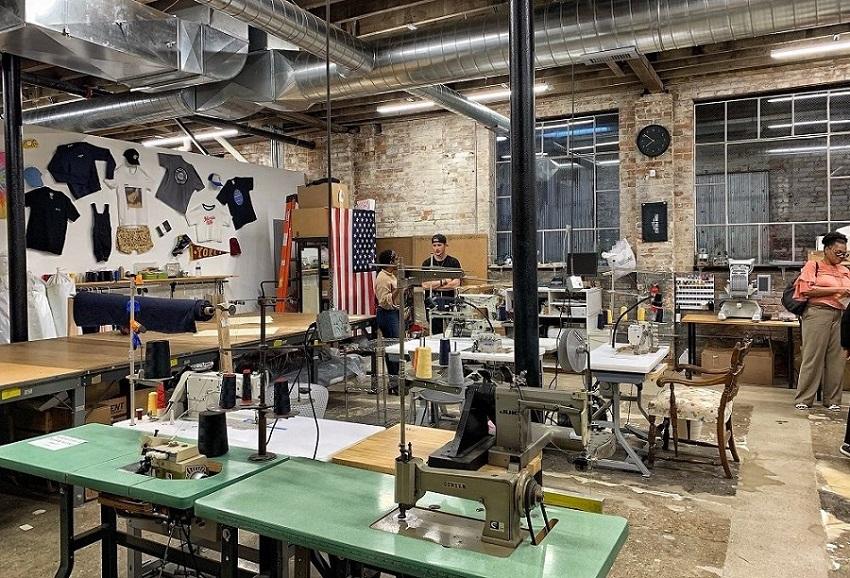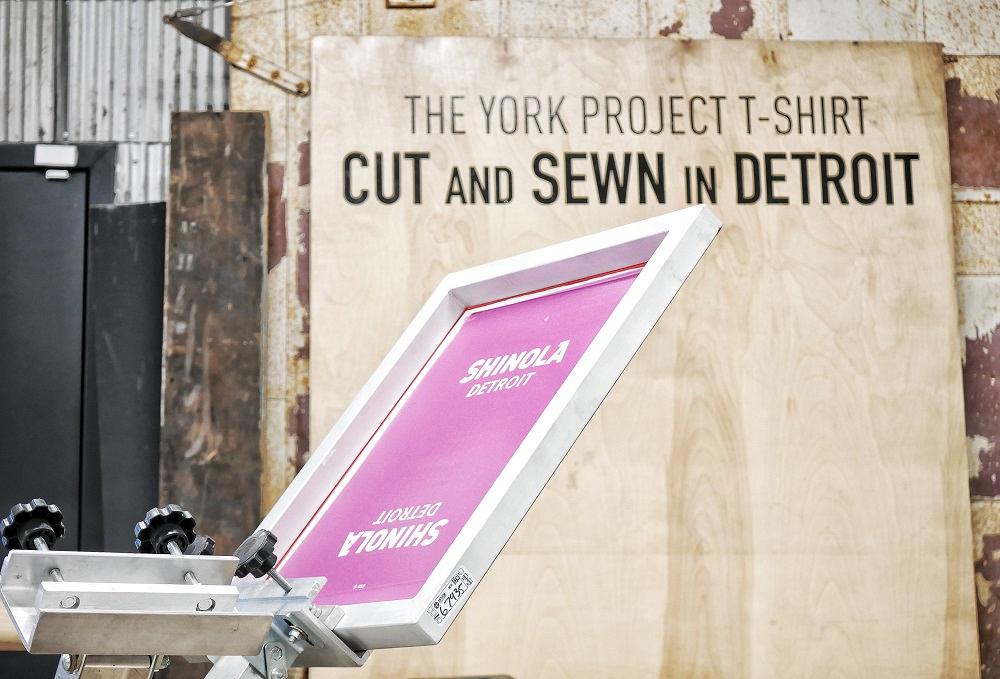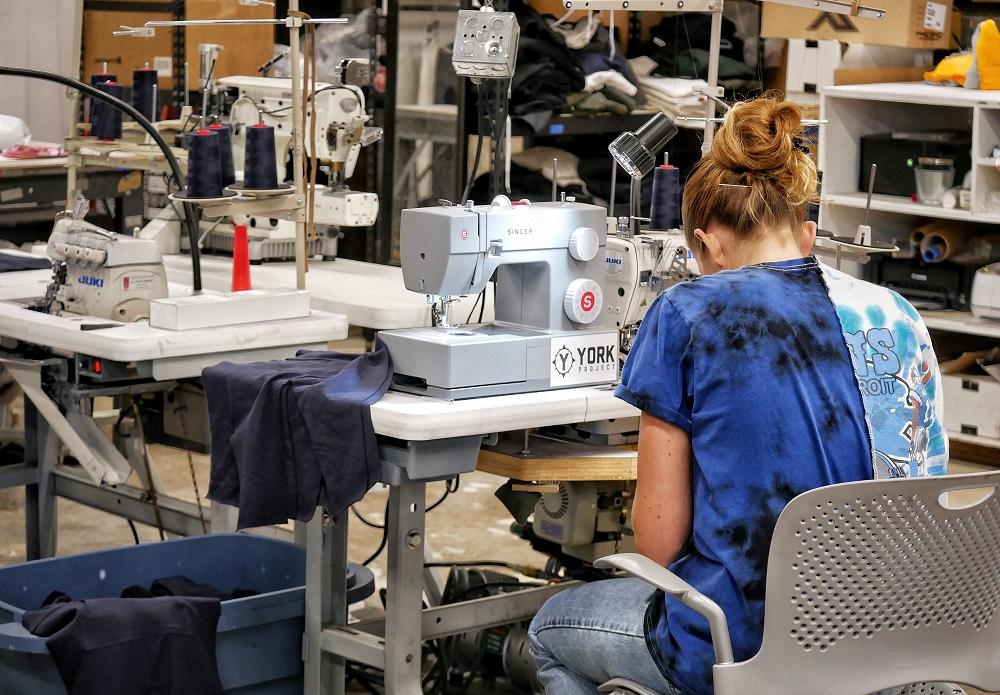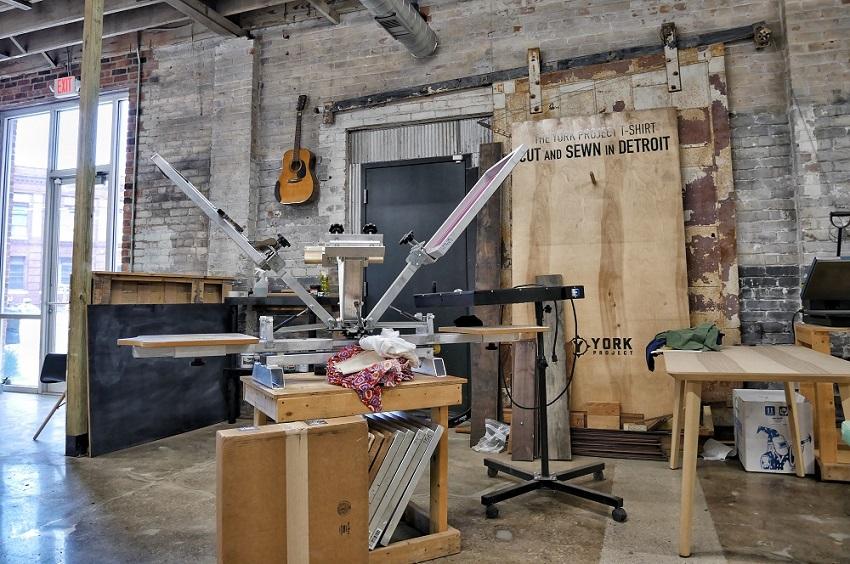- FMA
- The Fabricator
- FABTECH
- Canadian Metalworking
Categories
- Additive Manufacturing
- Aluminum Welding
- Arc Welding
- Assembly and Joining
- Automation and Robotics
- Bending and Forming
- Consumables
- Cutting and Weld Prep
- Electric Vehicles
- En Español
- Finishing
- Hydroforming
- Laser Cutting
- Laser Welding
- Machining
- Manufacturing Software
- Materials Handling
- Metals/Materials
- Oxyfuel Cutting
- Plasma Cutting
- Power Tools
- Punching and Other Holemaking
- Roll Forming
- Safety
- Sawing
- Shearing
- Shop Management
- Testing and Measuring
- Tube and Pipe Fabrication
- Tube and Pipe Production
- Waterjet Cutting
Industry Directory
Webcasts
Podcasts
FAB 40
Advertise
Subscribe
Account Login
Search
Still Building America: Detroit “social streetwear” clothing manufacturer York Project, Part I
Founder Josh York’s handmade clothing business focuses on giving back to homeless community
- By Darla Welton and Josh Welton
- September 5, 2019
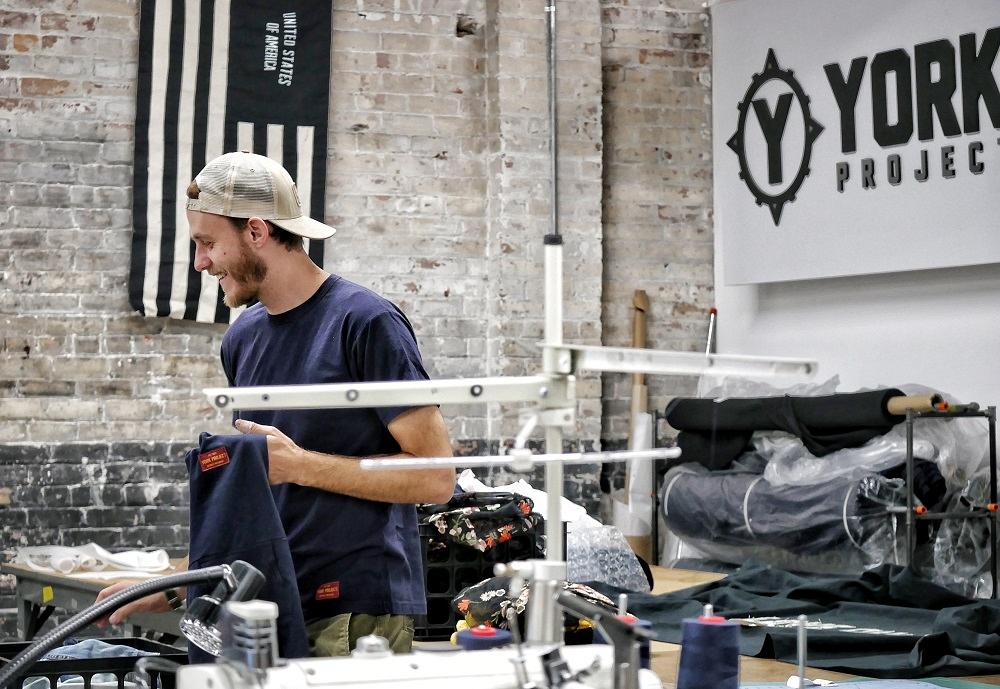
Josh York, founder of Detroit “social streetwear” clothing manufacturer York Project, in the company's workspace facility. Photos by Josh and Darla Welton
In the burgeoning creative community of Detroit, we often come across fresh and inspiring stories of young people who’ve got hustle and want to make a difference. Josh York of the York Project is one of them.
Tapping into his entrepreneurial spirit as a child by selling Silly Putty, Josh is now 26 years old and has built his own social streetwear brand, developed full-on merchandise lines and campaigns for large corporate brands, and donated over $91,000 (and counting) to homeless shelters and outreach programs. Josh’s passion for quality American-grown, -designed, and handmade clothing is legit.
Right around the corner from our home, a once-blighted building is now a developing retail and dining destination It’s the location of York Project’s new workshop and storefront. The expansive space is shared with Rebel Nell, a social enterprise that empowers women, creating graffiti jewelry from chipped paint and offering classes in financial success. The two like-minded businesses have production areas on opposite sides of the room and shared retail space in the middle. On this particular day both businesses are prepping for their grand opening event.
The shop is dynamic yet humble, and the vibe is optimistic – much like York himself. He has created mental and physical spaces where ideas can be tested, flourish, even become their own thing entirely. He welcomes us, apologizes for the chaos, and guides us to a small conference room situated behind the retail floor.
Josh York: Before moving into this new space York Project was located at Ponyride (a business incubator in Corktown, Detroit). It was a cool community. We were there for 14 months and that was the first jump from my parent’s basement to a space that gave us credibility.
Darla Welton: Share with us how you started.
JY: I’ve been selling things since I was 10. I used to make wreaths out of vines in my backyard and cut them and sell them to my grandma. I made Silly Putty in fourth grade. I started a lawn mowing business. And I had a Taco Bell delivery service in college. It’s just something I always enjoyed doing.
The first T-shirts I was making was in middle school. I was making iron-on shirts and selling them at school. And then in college that transitioned to being in a band and we were buying band merch and I thought, I can do this. So, I bought a screen press online, watched YouTube videos in my parents’ basement, and figured out how to make T-shirts. I messed up a million shirts but got good at it. Through college that kind of continued. I was just making my own clothes because I thought it was cool to have a clothing line.
Early on I became inspired by Toms Shoes. I thought, if I have this thing, what’s a way to give back with it? I’m from Detroit, so what’s an issue in Detroit? Homelessness fascinated me. I used to teach tennis at Detroit Golf Club and there was a guy that lived under the bridge. Every day I drove by him and thought about that. Like what’s his story? He seemed to be doing all right, but he had nothing. So, I had this clothing line going and thought I’d something like Toms but keep it in Detroit.
Josh Welton: I love that ethos.
JY: It’s what’s brought us here. Early on we didn’t have great product, but people bought into the mission, and that was when I was 19 years old. I’m 26 now. I went to college to study supply chain management and took corporate jobs. I worked for Boeing in Seattle, I worked at a big company in Chicago, I was gonna go work at Amazon and was interviewing at Apple. I had great opportunities, but the one thing I kept coming back to was clothes. I enjoyed making and designing clothes, so I took a job at Abercrombie & Fitch and I was a buyer for Hollister underwear. I bought 6 million pairs of underwear in a year!
I learned so much about how it really works, not just what I learned in my basement, but learning about how a big company buys thousands and thousands of yards of fabric and how the real process looks in the industry. But after a year there I was not happy and potentially was gonna get sued for breaching my contract and competing against them, so I quit in September 2017 and moved back home. This time two years ago I was in a meeting at Abercrombie and stepped out to take a call and negotiate a space at the local mall just across the hall from Abercrombie. Then I got called into a meeting with HR and they said, “We hear you’re competing with us?” It was crazy, but this thing was picking up steam and adding team members and I wanted to be back in Detroit. I just had enough and went for it. So, two years later here we are. This is our second building. We have two stores opening up in the next couple of months – it’s going! I’m proud of how it happened.
JW: What is the York Project doing that’s different when it comes to design?
JY: In the seven years we’ve been doing this business has changed a lot, mostly in the past year. Ninety percent of our business this year is actually not the York Project brand. When we bought these sewing machines and the table and started doing cut and sew work, we wanted to do that to differentiate ourselves.
Everyone prints “Detroit” on the same two or three T-shirts, and we’re all kind of doing the same thing. We have a mission, but still product-wise we’re not doing anything special. So, we wanted to get into making our own shirts from scratch and being able to pick the fabrics and the fits. And as we started to do that, we realized that a million other brands are looking for that same service, but no one does it. So that’s where our business is headed.
DW: Josh has your Shinola branded shirt. He’s got a thousand T-shirts, but that’s the one he wears the most.
JW: I want to buy a few more. I love that shirt.
JY: That’s cool to hear! Shinola was the first big client for us.
JW: I wonder why more companies don’t do private-label shirts like that.
JY: It’s hard to create a custom shirt like this. It’s very hard. Other non-American-made brands like Gildan can sell shirts for $3 each. Our cheapest shirt starts at $10 or $12, but it’s a way better shirt, it’s premium cotton grown, woven, and dyed in the U.S. There’s a story behind it. Luckily the economy is good and there are brands that are willing to spend that extra money. If things go bad, I don’t know, maybe we don’t make sense, but we are trying to get big enough that we can get that cost down and it’s already happening slowly.
JW: When I started doing Brown Dog Welding, I always wanted American-made shirts. They cost a little more, but if people are in the market to buy a $25 T-shirt, then they’ll buy a $30 T-shirt. We haven’t been able to buy any American-made hats though.
JY: That’s on my list the next two or three years. We’re gonna get into that. I’m a huge hat guy, and that’s actually what started this business – hats!
DW: Josh has been able to influence some of our sponsors and American companies that we associate with to change their merch over to American- made brands.
JY: Yes, the larger companies are the ones that have the power to help a small business or a local company. I find that they usually want to do it; they just need someone like Josh or Josh to tell them!
DW: So back to design stuff ...
JY: Most of our business is business-to-business (B2B). We launched a line for Chips Ahoy last weekend. We helped Planters peanuts launch a sneaker. We didn’t make the sneaker, but we did the photo shoot here in Detroit, we did the website, we do customer service. We launched that for them!
JW: Damn. It’s a whole other marketing business!
JY: Yeah, but they all fit together! For example, we are working with a huge brand – one of the biggest in the world – that needs merchandise and they don’t want to touch it. They simply don’t do merchandise, so we’ll design it, we’ll make it, we’ll build a website, and we’ll distribute it. They don’t have to touch it, they just cut us one check and it’s all handled. So again, learning from what we’ve done for our brand, we can do it for so many other brands. We’re good at it. We’ve got it down!
DW: And you’re doing it all out of this space right here?
JW: People don’t have a clue! (laughs)
DW: You have the capacity to handle all these larger accounts?
JY: For now. That’s something we’ve talked about. We might need more space in a year. And if that happens, we are doing something right. That’s a good problem!
And we couldn’t agree more. It’s inspiring to see how our simple ideas can become the real deal.
Check out Part II of our interview with Josh York. You can also keep up with York Project online at yorkproject.com or on Instagram @yorkproject.
Check more Still Building America stories and interviews from metal fabricators, welders, and small-business entrepreneurs.
subscribe now

The Fabricator is North America's leading magazine for the metal forming and fabricating industry. The magazine delivers the news, technical articles, and case histories that enable fabricators to do their jobs more efficiently. The Fabricator has served the industry since 1970.
start your free subscriptionAbout the Authors

Josh Welton
Owner, Brown Dog Welding
(586) 258-8255
- Stay connected from anywhere

Easily access valuable industry resources now with full access to the digital edition of The Fabricator.

Easily access valuable industry resources now with full access to the digital edition of The Welder.

Easily access valuable industry resources now with full access to the digital edition of The Tube and Pipe Journal.
- Podcasting
- Podcast:
- The Fabricator Podcast
- Published:
- 04/16/2024
- Running Time:
- 63:29
In this episode of The Fabricator Podcast, Caleb Chamberlain, co-founder and CEO of OSH Cut, discusses his company’s...
- Industry Events
16th Annual Safety Conference
- April 30 - May 1, 2024
- Elgin,
Pipe and Tube Conference
- May 21 - 22, 2024
- Omaha, NE
World-Class Roll Forming Workshop
- June 5 - 6, 2024
- Louisville, KY
Advanced Laser Application Workshop
- June 25 - 27, 2024
- Novi, MI
























